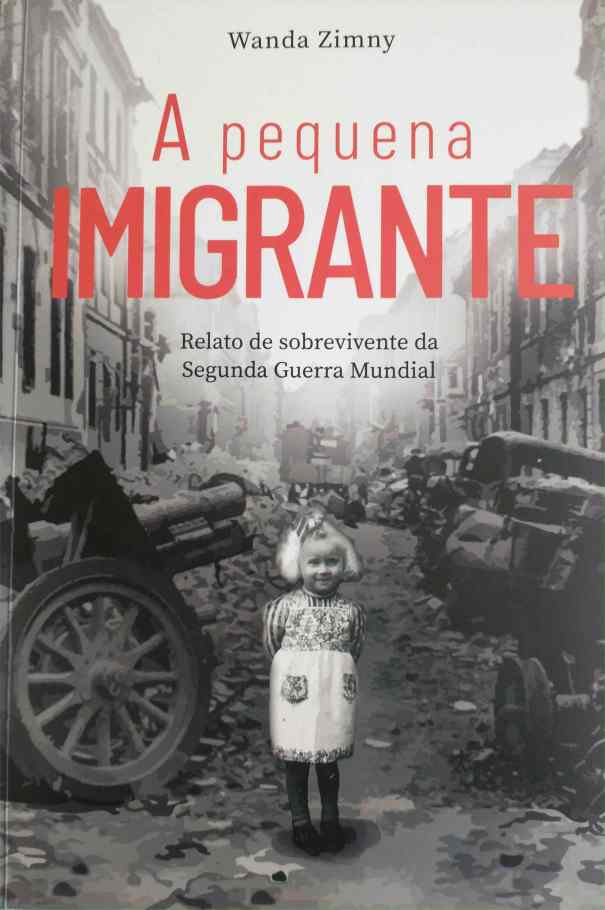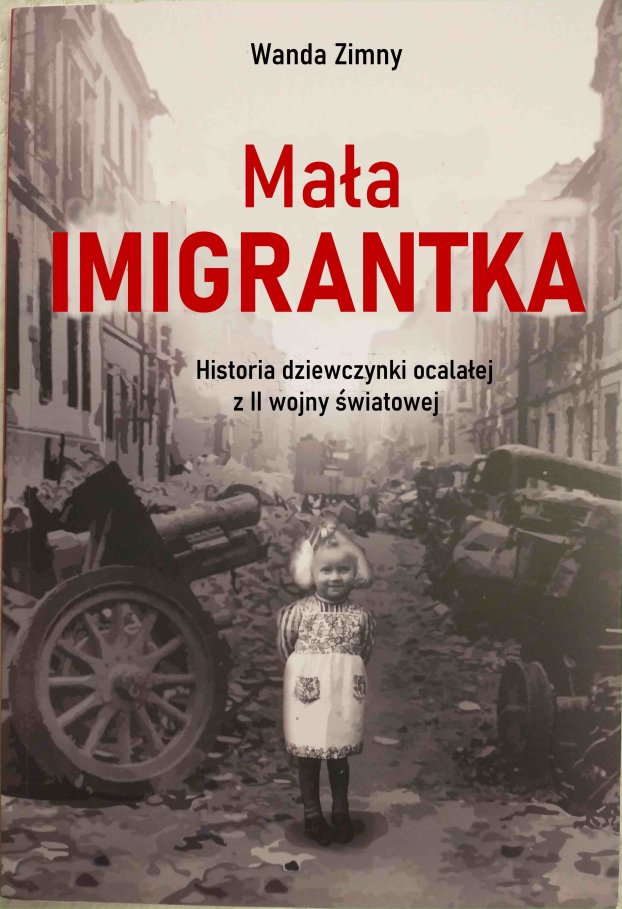|


- LITTLE IMMIGRANT
The story of a girl who survived World War II
and her family's emigration to Brazil
Translation from Portuguese - Barbara and Lesław Zimni
DEDICATION
I dedicate the book to my family: mother Julia, father Dariusz and
brother Lech (in memoriam).
And to all immigrants of various nationalities who experienced and
survived the horrors of World War II.
Wanda Zimny
REVIEW
The book is a narrative of the life of the Zimny family, seen through
the eyes of a little girl during World War II. Far from their home
country, alone, forced to do hard slave work. It is a family mini epic
in which the author describes in surprising detail the everyday life of
a child who lived in three countries, met people of other nationalities,
and, above all, saw the greatest of all wars taking place!
It's a synthesis of two stories. In the first one, Wanda talks about her
post-war emigration from Germany to Brazil, her experiences during a
long ship journey and the everyday life of those who were forced to
leave their country to start a new life abroad. In the second part, she
tells, through the eyes of Julia's mother, all the events related to the
deportation of the Zimny family from her beloved Poland to Germany for
forced labor, and from there the journey to distant and unknown Brazil.
The book is divided into two distinct but very interconnected parts. The
events of one result from the other. The reader learns the direct
accounts of those who survived World War II in a good literary narrative.
The story is so tragic that it seems fictional.
Wanda decided to write this book to preserve the memory of her mother,
closest friend, father and siblings, and so that other immigrants from
that time and their descendants could read her story and identify with
these events.
Wanda was left alone in the foreign land. All descendants of her family
who survived this tragic time with her are no longer alive. The author
decided to act and do something that would leave the story of their
lives as a legacy. The bond with her mother was always so strong that
from a friend and confidant, Wanda also became her biographer,
dedicating her life's work to Julia and her father and brother.
Humberto Ohlweiler
Ayres, Profesor Portuguese language and literature
PREFACE
- It is an honor, an honor and a
great responsibility for me to preface this work with a foreword. In
2014, I completed an internship as a social worker at CRAS (Social
Assistance Center) in the Porto Alegre metropolitan area, in the
Alvorada district. There I met Mrs. Wanda, a member of a group of
seniors of Polish origin. She revealed to me her desire to write a
story about her family who survived World War II.
I watched the sparkle and emotion in her eyes. I said, “Then put
your whole story down on paper and make your dreams come true!”
And she, at the age of 75, despite difficulties and uncertainty (not
knowing whether the book would be published), wrote with pleasure;
and the more poems she wrote down, the more her memory came back to
those times. As the author herself says: "It seemed to me that they
were whispering in my ear."
The story was written in a very particular way.
That's why I take on the responsibility of describing the work,
looking for the sensitivity with which Wanda had to talk about the
war seen through the eyes of a child.
The book is divided into two parts. In the first part, the author
talks about going to Brazil in the post-war period and life after
arrival. Living with different ethnic groups brought rich
experiences, but they did not know how difficult it would be, even
with the support of old emigrants. The difficulties were enormous.
In the second part of the book, titled "How it all began", Wanda
describes the entire history of the formation of her family: the
marriage of her parents just after the outbreak of the war, when
Poland, the geographically closest country, was the first occupied
country, and its people had to work slaves for the occupier only for
modest food.
Wanda survived the war and talks in detail about those times when
she and her family suffered so much. The will to live was so strong
that they could survive the most difficult situations. Only those
who survived the war know how precious life is. Despite so much
suffering, man's goal is to protect life.
The book tells in detail about a journey to Brazil in search of an
uncertain future, about coexistence with many immigrants, about the
bitterness of leaving the homeland and leaving loved ones, with the
only certainty that they will never see them again and the feeling
that now they will belong to a completely new, different world.
History also emphasizes that unity and solidarity minimize
differences between people and give strength to man. I believe that
many immigrants reading this work will identify with the various
experiences they have had and will be moved by it.
Wanda's friendship with her mother Julia is also important. The
mother passed on her entire story to her daughter, hoping that one
day the world would know her life and the lives of other people.
The work is a testimony to the courage and overcoming the hardships
of life of many immigrants who fought for everyday survival and
accepted Brazil as their new homeland.
In this foreword, I want to emphasize that we must dream dreams...
And that making them come true is our mission. And that's exactly
what Wanda Zimna did: she fulfilled her dream of writing the book of
her life, she did it for all immigrants.
Congratulations to the author and everyone who contributed to making
this dream come true.
Carla Rosane Lopes
de Freitas, social worker
FROM
THE TRANSLATORS
- Wanda, who had not written literary texts before, at
the age of 75, wrote an autobiographical novel by hand (without
a computer) in a short time. It required a lot of courage and
determination from her. She described in great detail the
history of her family in three countries. The book is read with
great interest, but also with compassion and disbelief that it
really happened. That these young people with small children,
working as slaves beyond their strength, survived these tragic
years during the German occupation.
- After the death of her parents, Wanda can no
longer speak Polish. Her father died 43 years ago and her mother
33 years ago. Despite this, he still speaks Polish perfectly.
She cultivates Polish customs and traditions learned from her
family home. Is there anyone in Brazil from Poland or other
nationalities who could speak their native language so
beautifully after so many years?
Wanda retained the true Polish patriotism passed on by her
parents and has retained her Polish citizenship to this day.
Such patriotism is lacking among contemporary descendants of
immigrants in Brazil. Residents of other nationalities, as well
as Poles, should learn it from Her.
A nation without history is like a tree without roots. That is
why it is so important to cultivate our traditions and customs
and preserve the language of our ancestors.
-
- We learned about the war in history classes. We also
know it from the stories of parents who survived those
terrible years, but this was only information. With your
book, you showed us what the war really was and what life
was like on forced labor and in emigration.
Wanda, dear cousin, thank you for this book.
Barbara and Lesław Zimni, Wrocław 1.10.2021 r. |

